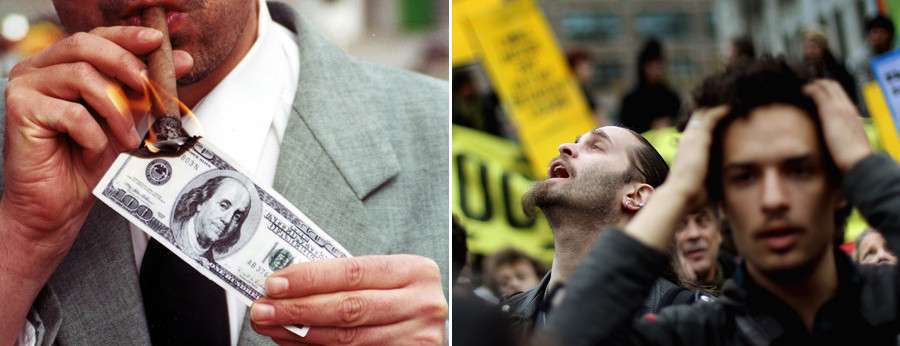Significantly more Americans see "very strong" or "strong" class conflict between the rich and poor, according to a survey released Wednesday by the Pew Research Center. The results show that Americans think that conflicts between the rich and poor are stronger than immigrant and native born, black and white and young and old.
In 2009, 47 percent of respondents said there were "very strong" or "strong" conflicts between the rich and poor. In 2011, 66 percent saw the same, possibly signaling that the "We are the 99 percent" rhetoric of Occupy Wall Street has had an impact. The ongoing economic recession also may have magnified class differences as income inequality has risen, continuing a trend occurring in American society since at least the 1970s.
Democrats in general -- and President Barack Obama in specific -- have also spoken out about income inequality. "Now, this kind of inequality -- a level that we haven't seen since the Great Depression -- hurts us all," Obama said in a December speech in Kansas. The GOP front-runner for the presidency, Mitt Romney, has in turn charged Obama with promulgating the "politics of envy" and said that discussions over the distribution of wealth were "fine" to talk about "in quiet rooms in discussions about tax policy."
Media mentions about income inequality have also risen significantly since the start of the Occupy Wall Street movement.
The Pew survey found that whites had significantly larger increases in perception of class conflict than blacks and hispanics, rising to 65 percent from 43 percent in 2009. Seventy-four percent of blacks and 61 percent of hispanics see class conflicts, increasing by single digits from 2009.
The perception of class conflict has also intensified -- 30 percent see "very strong conflicts," a figure that doubled from 2009. marking the largest increase since the question was first asked in 1987.
Other social conflicts were less intense. Thirty-eight percent of Americans saw "very strong" or "strong" conflicts between blacks and whites, virtually unchanged from 2009, and 62 percent saw "very strong" or "strong conflict" between immigrants and native born, up 7 percent from 2009. Thirty-four percent saw "very strong" or "strong" conflicts between young and old, up 11 percent from 2009.
Grievances, however, against the wealthy did not increase, with 46 percent saying that rich people "are wealthy mainly because they know the right people or were born into wealthy families," and 43 percent saying they are wealthy because "of their own hard work, ambition or education."
Young people -- suffering the highest levels of unemployment -- see class conflict significantly more than older people, with 71 percent of people aged 18 to 34 seeing "very strong" or "strong" class conflicts while just 55 percent of people over 65 see them.
Republicans see class conflict less than Democrats and independents. GOP leaders have dismissed calls to raise taxes on the wealthy, calling it "class warfare." Still, 55 percent of Republicans see "strong" or "very strong" class conflicts in comparison to 73 percent of Democrats and 68 percent of independents.
Original Article
Source: Huff
In 2009, 47 percent of respondents said there were "very strong" or "strong" conflicts between the rich and poor. In 2011, 66 percent saw the same, possibly signaling that the "We are the 99 percent" rhetoric of Occupy Wall Street has had an impact. The ongoing economic recession also may have magnified class differences as income inequality has risen, continuing a trend occurring in American society since at least the 1970s.
Democrats in general -- and President Barack Obama in specific -- have also spoken out about income inequality. "Now, this kind of inequality -- a level that we haven't seen since the Great Depression -- hurts us all," Obama said in a December speech in Kansas. The GOP front-runner for the presidency, Mitt Romney, has in turn charged Obama with promulgating the "politics of envy" and said that discussions over the distribution of wealth were "fine" to talk about "in quiet rooms in discussions about tax policy."
Media mentions about income inequality have also risen significantly since the start of the Occupy Wall Street movement.
The Pew survey found that whites had significantly larger increases in perception of class conflict than blacks and hispanics, rising to 65 percent from 43 percent in 2009. Seventy-four percent of blacks and 61 percent of hispanics see class conflicts, increasing by single digits from 2009.
The perception of class conflict has also intensified -- 30 percent see "very strong conflicts," a figure that doubled from 2009. marking the largest increase since the question was first asked in 1987.
Other social conflicts were less intense. Thirty-eight percent of Americans saw "very strong" or "strong" conflicts between blacks and whites, virtually unchanged from 2009, and 62 percent saw "very strong" or "strong conflict" between immigrants and native born, up 7 percent from 2009. Thirty-four percent saw "very strong" or "strong" conflicts between young and old, up 11 percent from 2009.
Grievances, however, against the wealthy did not increase, with 46 percent saying that rich people "are wealthy mainly because they know the right people or were born into wealthy families," and 43 percent saying they are wealthy because "of their own hard work, ambition or education."
Young people -- suffering the highest levels of unemployment -- see class conflict significantly more than older people, with 71 percent of people aged 18 to 34 seeing "very strong" or "strong" class conflicts while just 55 percent of people over 65 see them.
Republicans see class conflict less than Democrats and independents. GOP leaders have dismissed calls to raise taxes on the wealthy, calling it "class warfare." Still, 55 percent of Republicans see "strong" or "very strong" class conflicts in comparison to 73 percent of Democrats and 68 percent of independents.
Original Article
Source: Huff

No comments:
Post a Comment